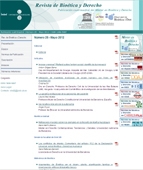Asedio compasivo: los vericuetos del cuidar.
DOI:
https://doi.org/10.1344/rbd2013.28.7488Keywords:
Vulnerability, Alzheimer, early diagnosis, autonomy, abuse, Human Rights.Abstract
Alzheimer’s is on the way to becoming one of the world’s most serious health care problems. Associated with the rising average age of the population, it is one of the diseases with the highest impact particularly on both persons affected by it, their close relatives and the health system and, in general, the whole of society. There is currently no cure for this disease and the speed of its development remains unknown although a long period of opportunity between detecting the disease and the onset of the first symptoms has been noticed. So the greatest efforts in research and discoveries have focused on detecting the disease at an early stage. This leads us to observe the existence of a major bioethical problem in this period linked to health and family care which concerns the autonomy, privacy and dignity of persons detected. Abuse can be committed at home, in care homes and hospitals, but how this is done in one place or the other differs, so additional variables to already established protocols regarding abuse in hospitals and Ethics Care Committees have to be considered, such as compassionate harassment.Downloads
How to Cite
Buxó Rey, M. J. (Maria J., & Casado, M. (2013). Asedio compasivo: los vericuetos del cuidar. Revista De Bioética Y Derecho, (28), 4–19. https://doi.org/10.1344/rbd2013.28.7488
Issue
Section
General section
License
 The author retains the copyright and grants Revista de Bioética y Derecho the right of first publication of the article. All articles published in Revista de Bioética y Derecho are under Creative Commons licensing Recognition – Non Commercial – NoDerivedArtwork (by-nc-nd 4.0), which allows sharing the content with third parties, provided that they acknowledge its authorship, initial publication in this journal and the terms of the license. No commercial use of the original work or generation of derivative works is permitted.
The author retains the copyright and grants Revista de Bioética y Derecho the right of first publication of the article. All articles published in Revista de Bioética y Derecho are under Creative Commons licensing Recognition – Non Commercial – NoDerivedArtwork (by-nc-nd 4.0), which allows sharing the content with third parties, provided that they acknowledge its authorship, initial publication in this journal and the terms of the license. No commercial use of the original work or generation of derivative works is permitted.







